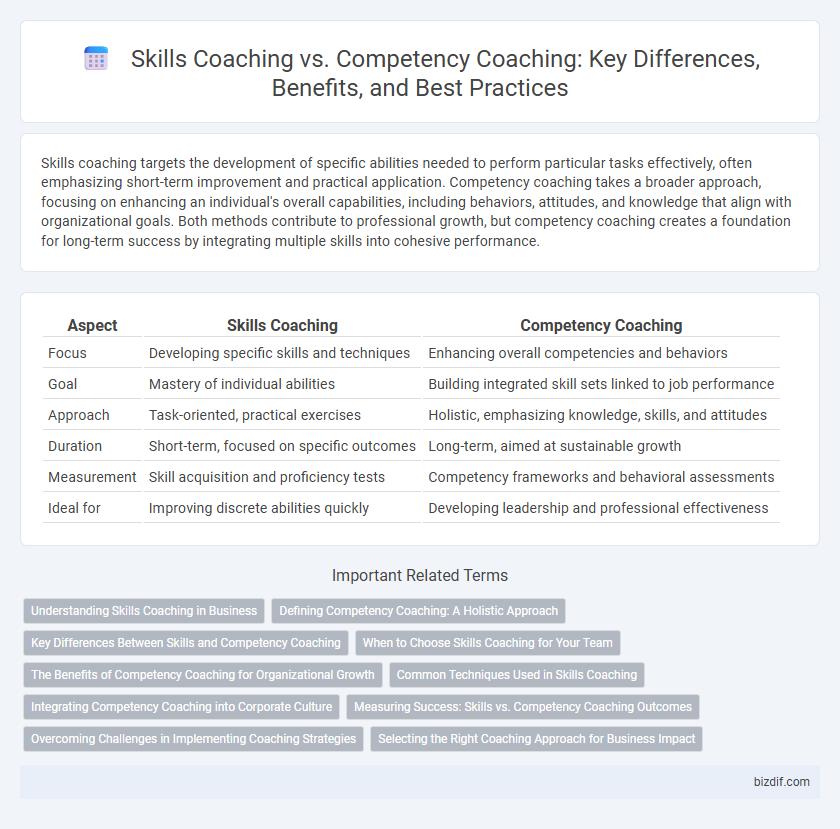Skills coaching targets the development of specific abilities needed to perform particular tasks effectively, often emphasizing short-term improvement and practical application. Competency coaching takes a broader approach, focusing on enhancing an individual's overall capabilities, including behaviors, attitudes, and knowledge that align with organizational goals. Both methods contribute to professional growth, but competency coaching creates a foundation for long-term success by integrating multiple skills into cohesive performance.
Table of Comparison
| Aspect | Skills Coaching | Competency Coaching |
|---|---|---|
| Focus | Developing specific skills and techniques | Enhancing overall competencies and behaviors |
| Goal | Mastery of individual abilities | Building integrated skill sets linked to job performance |
| Approach | Task-oriented, practical exercises | Holistic, emphasizing knowledge, skills, and attitudes |
| Duration | Short-term, focused on specific outcomes | Long-term, aimed at sustainable growth |
| Measurement | Skill acquisition and proficiency tests | Competency frameworks and behavioral assessments |
| Ideal for | Improving discrete abilities quickly | Developing leadership and professional effectiveness |
Understanding Skills Coaching in Business
Skills coaching in business focuses on developing specific, task-oriented abilities that enhance employee performance and productivity. It targets practical expertise such as communication, time management, and technical proficiencies critical for achieving organizational goals. This approach provides measurable improvements by honing discrete skills that directly impact job effectiveness and business outcomes.
Defining Competency Coaching: A Holistic Approach
Competency coaching centers on developing an individual's comprehensive capabilities, blending skills, knowledge, behaviors, and attitudes needed for specific roles or organizational goals. This holistic approach goes beyond isolated skill improvement by fostering adaptability, critical thinking, and emotional intelligence crucial for sustained performance. Competency coaching aligns personal growth with business objectives, enhancing overall workforce effectiveness and long-term career success.
Key Differences Between Skills and Competency Coaching
Skills coaching targets specific abilities or tasks, enhancing practical proficiency in areas such as communication or technical expertise. Competency coaching encompasses broader behavioral and cognitive attributes, integrating skills with values, attitudes, and knowledge essential for overall performance. The key difference lies in skills coaching's focus on discrete skill development versus competency coaching's holistic approach to professional growth and organizational alignment.
When to Choose Skills Coaching for Your Team
Skills coaching is ideal when teams need to develop specific abilities quickly to address immediate performance gaps or adapt to new tools and technologies. It focuses on practical, task-oriented learning tailored to enhance proficiency in defined skill sets. Choose skills coaching when there is a clear requirement for hands-on improvement in particular areas such as communication, technical expertise, or project management.
The Benefits of Competency Coaching for Organizational Growth
Competency coaching drives measurable organizational growth by aligning employee capabilities with strategic business objectives, fostering a culture of continuous improvement. It enhances workforce adaptability and productivity through targeted development of core competencies essential for industry relevance. This approach not only boosts individual performance but also strengthens overall organizational resilience and innovation capacity.
Common Techniques Used in Skills Coaching
Skills coaching employs targeted techniques such as deliberate practice, feedback loops, and modeling to enhance specific abilities like communication, problem-solving, and technical proficiency. Role-playing and simulation exercises are frequently used to create real-world scenarios that improve skill application and retention. Ongoing assessments and personalized development plans ensure measurable growth in critical skill sets aligned with individual or organizational goals.
Integrating Competency Coaching into Corporate Culture
Integrating competency coaching into corporate culture enhances employee performance by aligning skill development with organizational goals and values. Competency coaching targets specific behavioral traits and core abilities essential for long-term success, creating a unified framework that supports consistent growth across teams. This approach fosters a culture of continuous improvement, enabling companies to adapt effectively in competitive markets while maintaining employee engagement.
Measuring Success: Skills vs. Competency Coaching Outcomes
Skills coaching measures success through specific, observable improvements in task performance and technical abilities, using quantifiable metrics such as speed, accuracy, and proficiency benchmarks. Competency coaching evaluates broader behavioral changes and application of knowledge in real-world scenarios, often assessed via 360-degree feedback, performance appraisals, and alignment with organizational values. The choice between skills and competency coaching impacts the precision and scope of outcome measurement, influencing how developmental progress is tracked and validated.
Overcoming Challenges in Implementing Coaching Strategies
Skills coaching targets specific abilities through hands-on practice and feedback, while competency coaching emphasizes broader behavioral patterns and mindset shifts essential for sustained growth. Overcoming challenges in implementing these strategies often requires aligning coaching approaches with organizational goals and ensuring coaches possess deep subject-matter expertise and emotional intelligence. Effective stakeholder engagement and continuous assessment foster smoother integration and measurable improvements in performance.
Selecting the Right Coaching Approach for Business Impact
Skills coaching targets specific abilities such as communication, time management, or technical expertise, enabling immediate performance improvements. Competency coaching emphasizes broader behavioral traits and mindset shifts essential for leadership, problem-solving, and strategic thinking. Selecting the right coaching approach depends on aligning business goals with the desired outcome, whether enhancing practical skills or fostering adaptive competencies for long-term organizational success.
Skills Coaching vs Competency Coaching Infographic

 bizdif.com
bizdif.com